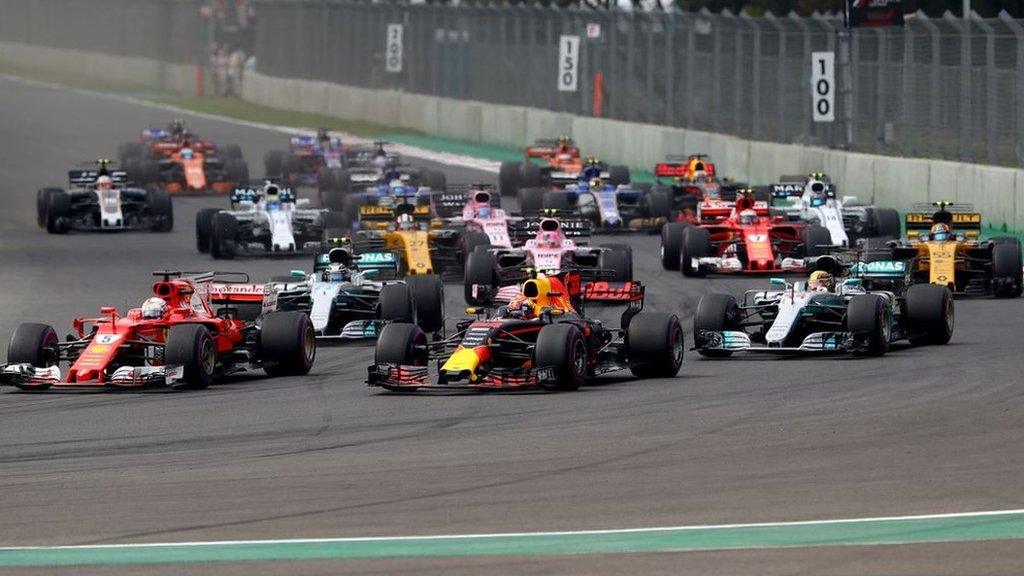Proposed new Formula 1 engine rules backed by Ilmor and Cosworth
- Published
- comments
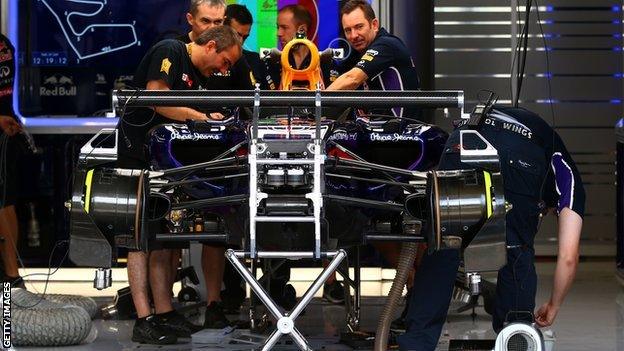
Red Bull racing currently use Renault as their engine supplier
Independent engine companies Ilmor and Cosworth have backed Formula 1's proposed new rules as a potential entry route for new competitors.
The pair say it is almost impossible for a new company to compete with the current engine suppliers under the existing rules.
Cosworth managing director Bruce Wood said: "The current regulation is beyond any new entrant, technically and for the commercial investment it requires.
"The new proposal makes it possible for an independent or existing car company."
Cosworth was the last independent engine manufacturer to take part in F1, before pulling out after 2013.
Steve Miller, managing director of Ilmor which ran the Mercedes F1 engine programme until the early 2000s, said the new rules proposed last week by governing body the FIA and the F1 Group from 2021 "open the scope to a much broader range of manufacturers" by making it cheaper to design and build an F1 engine.
However, both companies say they would need investment from an external backer before they could contemplate making an F1 engine, even under the proposed new rules.
The proposal by FIA and F1 is to retain the current engine architecture of a 1.6-litre V6 turbo hybrid but simplify it by removing the most complex part of the hybrid system - the so-called MGU-H, which recovers energy from the turbo - and impose restrictions on a number of parts.
Three of F1's current engine manufacturers, Mercedes, Ferrari and Renault, have expressed misgivings about aspects of the plan.
Mercedes and Renault say it will increase their costs by forcing them to effectively design an all-new engine, while Ferrari say it diminishes "power-train uniqueness" and have threatened to quit F1 if the new rules are not to their liking.
Ilmor and Cosworth, in exclusive interviews with BBC Sport, say:
Changing and simplifying the engine rules is effectively the only way F1 could attract new engine companies
Even under the new rules proposal, small companies such as them would still need a partnership with a car company to design and build an F1 engine
Removing the MGU-H is key if F1 wants new entrants
It will always be difficult for smaller companies to compete on a level playing field with giants such as Mercedes and Ferrari, whatever the rules
The proposed engine rules will be discussed at a meeting of F1's strategy group of leading figures on Tuesday, along with other aspects of the vision for the future of the sport by new owners Liberty Media, which bought the F1 Group earlier this year.
Backing for plan
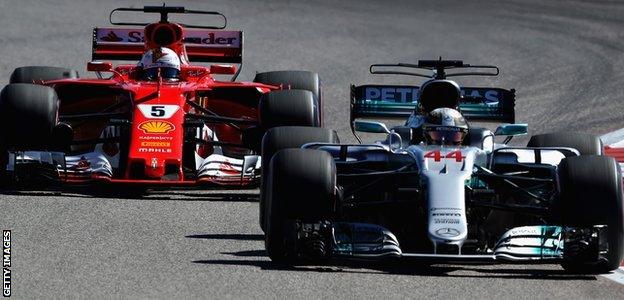
Mercedes and Ferrari have won 15 of the 18 Formula 1 races so far this season
F1 and the FIA are concerned that the engine rules are over-complex and require too great a financial investment to attract new companies.
They fear this makes F1 too dependent on the existing car manufacturers and vulnerable if they decide to quit.
There are also concerns that the engines lack visceral appeal to spectators. Although they have set new benchmarks for efficiency with their revolutionary technology, their sound is widely considered to be unattractive.
They want a new engine concept that is cheaper, noisier, simpler, that enables new companies to enter F1 and is more attractive to fans.
Miller says: "It's inherently the right thing to do to get away from an over-complicated product that doesn't sound good and is not really turning on the fans.
"If they come out of this with a measured view of what's required to get more manufacturers on the grid, then it is easily achievable from the platform they are working from and I think they are headed in the right direction."
Wood said: "We think the (proposed) rules are something that open it up to a much wider group of people technically and to a much smaller amount of money, which can only interest more people.
"The key thing is that anybody new coming in would have to spend a lot, lot less.
"Certainly no independent could contemplate it under the current rules and any car company or anyone else entering now knows it is a many hundreds of millions bill and in the current world I'm not sure anybody can tolerate that."
Wood says he can "see why the proposal is controversial" but adds: "It is impossible to say the status quo as it is now can be maintained for the long term and if one of the current players should drop out, I don't think they are going to be replaced by anybody so I think they have taken a long-term view and said: 'It's probably not going to be popular but it does protect the sport longer term.'"
Why are the new rules controversial?
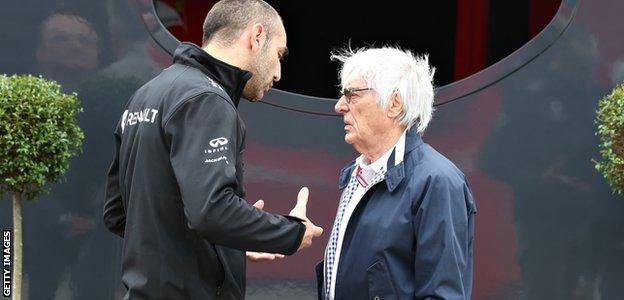
Renault's Cyril Abiteboul, talking to Bernie Ecclestone, would prefer to tweak the existing F1 engine rather than introduce a new one
The existing manufacturers have collectively ploughed hundreds of millions into the design of the existing F1 engines and are reluctant to see that wasted.
One particularly controversial aspect of the new proposal is the decision to ditch the MGU-H, which provides 60% of the total hybrid energy of the current engines, the best of which have around 1,000bhp at full power.
Wood says the MGU-H is "a huge part" of why it would be so difficult for a new company to enter F1 under the current rules.
"It's hugely expensive, hugely complex and you're always going to be many years behind starting from ground zero with heat energy recovery," he added.
But Renault Sport managing director Cyril Abiteboul told BBC Sport: "We actually believe that the MGU-H is a fantastic device in order to have sustainable power around the lap and during the whole race. So that is the sort of disconnect we may be finding ourselves in right now.
"My problem with the removal of the MGU-H is that as soon as you do that it is a new engine.
"It fundamentally changes the way the energy is managed within the engine, the way the turbo is working and so on and so forth. It is a new combustion concept, a new way to manage turbo lag and efficiency, so it is new design of turbo and so on - a new engine."
Abiteboul said he would prefer to try to resolve the aims of the new rules by tweaking the existing engines rather than introducing a new one.
Mercedes F1 boss Toto Wolff said: "What we need to look at is costs, certainly development costs for the OEMs (car manufacturers). It is an area we need to tackle.
"We also understand that the quality of sound is something we need to improve. But we must avoid developing a new engine concept that will trigger immense costs."
But will new companies come in?
Just because a new engine concept makes it easier for new entrants in F1, does not necessarily mean any will take the plunge.
Miller said "the prospect of getting external backing (for an Ilmor engine) is very, very unlikely" but added that it was "likely" smaller car companies than the giants in F1 "are going to look at it as a viable prospect and they may well decide the most viable way forward is to use sub-contractors such as ourselves and Cosworth".
Wood said that smaller manufacturers would always be at a disadvantage compared to the likes of Mercedes but that the proposed new rules would enhance their ability to compete.
"There has been a lot of talk of levelling the playing field," Wood said. "I don't think it does level the playing field. Mercedes/Ferrari/Renault/Honda have got hundreds if not thousands of hugely intelligent people working on this. But what it does mean is a law of diminishing returns.
"Whereas at the moment there is a disparity of 5-10% up and down the grid depending on who's got it right and who's got it not quite so right, with a regulation of this sort, you reduce that disparity to maybe 1%."
However, although the VW Group, Aston Martin, Italy's Magneti Marelli, Austria's AVL, Ilmor and Cosworth have all attended meetings about F1's future engine rules, none have so far committed to enter.
And Mercedes and Renault have told the FIA and F1 that they risk upsetting the current suppliers with no guarantee they can be replaced.
Abiteboul said: "The first objective of any new rule should be hopefully to keep the existing manufacturers.
"I am absolutely not putting a threat. But what I am saying is that F1 is not doing that bad right now given the overall economic situation of the world.
"You have a number of teams, diversity of teams, four engine manufacturers, three engine manufacturers were competitive in the last weekend. Maybe not equally reliable but at least equally competitive and that's not that bad.
"So we need to be a little bit careful not to try to fix something that is not broken. F1 is not broken. It might be good to have more manufacturers but we should not jeopardise all of F1 just to try to attract someone else."
- Published3 November 2017
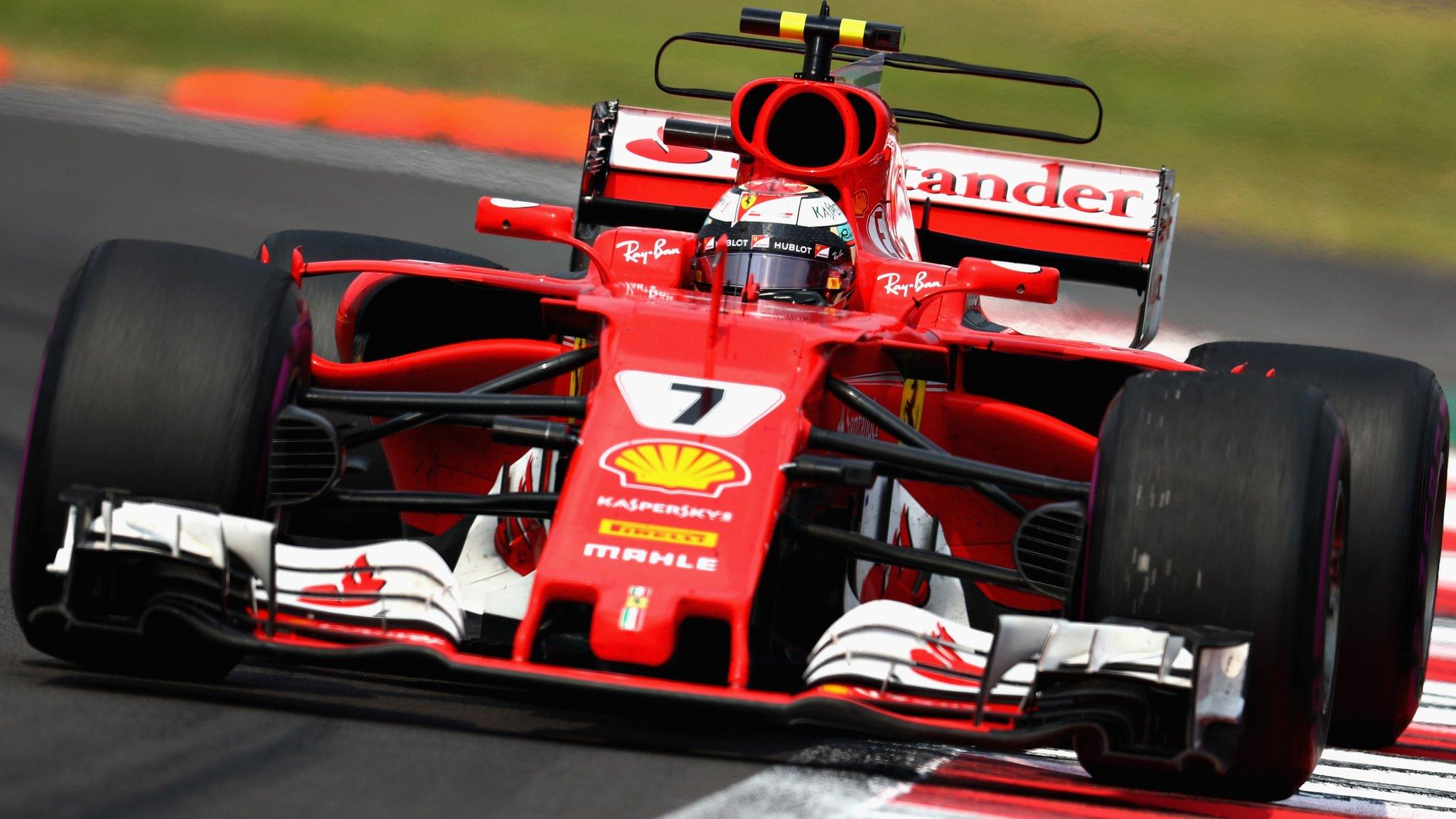
- Published1 November 2017
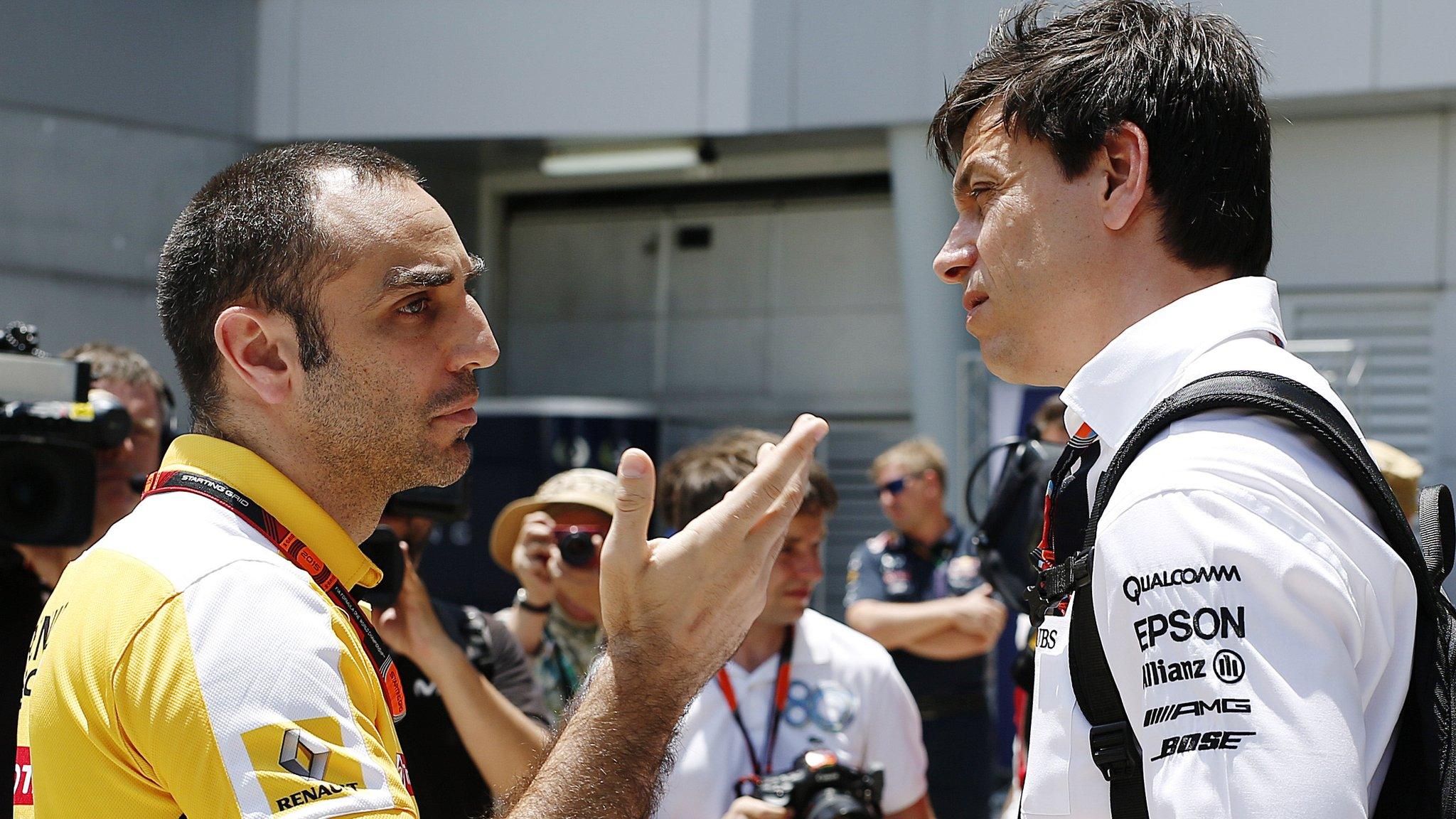
- Published31 October 2017
